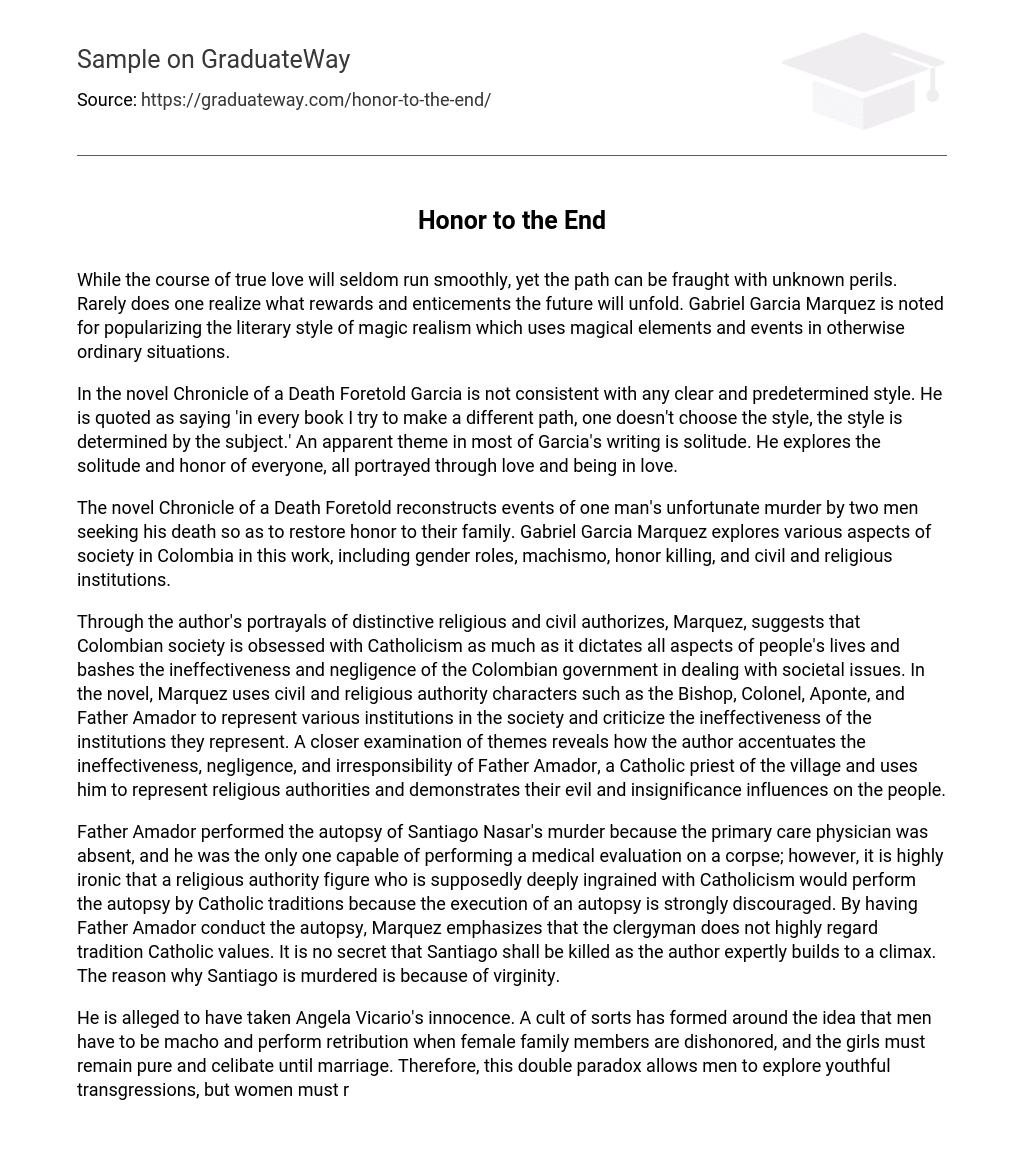While the course of true love will seldom run smoothly, yet the path can be fraught with unknown perils. Rarely does one realize what rewards and enticements the future will unfold. Gabriel Garcia Marquez is noted for popularizing the literary style of magic realism which uses magical elements and events in otherwise ordinary situations.
In the novel Chronicle of a Death Foretold Garcia is not consistent with any clear and predetermined style. He is quoted as saying ‘in every book I try to make a different path, one doesn’t choose the style, the style is determined by the subject.’ An apparent theme in most of Garcia’s writing is solitude. He explores the solitude and honor of everyone, all portrayed through love and being in love.
The novel Chronicle of a Death Foretold reconstructs events of one man’s unfortunate murder by two men seeking his death so as to restore honor to their family. Gabriel Garcia Marquez explores various aspects of society in Colombia in this work, including gender roles, machismo, honor killing, and civil and religious institutions.
Through the author’s portrayals of distinctive religious and civil authorizes, Marquez, suggests that Colombian society is obsessed with Catholicism as much as it dictates all aspects of people’s lives and bashes the ineffectiveness and negligence of the Colombian government in dealing with societal issues. In the novel, Marquez uses civil and religious authority characters such as the Bishop, Colonel, Aponte, and Father Amador to represent various institutions in the society and criticize the ineffectiveness of the institutions they represent. A closer examination of themes reveals how the author accentuates the ineffectiveness, negligence, and irresponsibility of Father Amador, a Catholic priest of the village and uses him to represent religious authorities and demonstrates their evil and insignificance influences on the people.
Father Amador performed the autopsy of Santiago Nasar’s murder because the primary care physician was absent, and he was the only one capable of performing a medical evaluation on a corpse; however, it is highly ironic that a religious authority figure who is supposedly deeply ingrained with Catholicism would perform the autopsy by Catholic traditions because the execution of an autopsy is strongly discouraged. By having Father Amador conduct the autopsy, Marquez emphasizes that the clergyman does not highly regard tradition Catholic values. It is no secret that Santiago shall be killed as the author expertly builds to a climax. The reason why Santiago is murdered is because of virginity.
He is alleged to have taken Angela Vicario’s innocence. A cult of sorts has formed around the idea that men have to be macho and perform retribution when female family members are dishonored, and the girls must remain pure and celibate until marriage. Therefore, this double paradox allows men to explore youthful transgressions, but women must remain pure and be content as they are revered as loyal mothers and wives.
In the novel, Santiago Nasar is a victim of a crime he didn’t commit and was put to death because he was falsely accused. Normally the twins Vicario brothers, Pedro and Pablo would have not been so dedicated, but this ill-fated scenario involved their sister. The Vicario brothers were characterized as spending most of their time ‘drinking since the eve of the wedding…[and] they looked, rather, like insomniac sleepwalkers’ so no one would expect them to commit any acts of crime especially like murder (Marquez 16).
They had to represent their love and ‘’honor” for their lying, mischievous sister, Angela (Marquez 56). The unbearable task was fulfilled with a certain cost, unknowing the murder they committed was purely based off of a false accusation. Marquez made Angela into the complete realistic moral character we see today. Even though no one is perfect, she has lost her innocence, before the book mention, by having sex outside of marriage and to make it worst through the middle of the novel was when she ‘flew off to gossip with generations of moths’ (Thom Schramm 126).
She was charming, but also unattractive. Her appearance has led her up to a marriage that wasn’t supposed to materialize. She never wanted to marry Bayardo San Roman. She knew she would not live a conformable life with him, and she desperately wanted to be with Santiago Nasar. The deceit in her heart caused her to concoct a story that ended the life of the innocent, Santiago. Since the Vicario brothers were close to one another and could be mistaken for each other, they counted on each other to follow through with the premeditated plot, even though they did not wait for Santiago to provoke them with insults and denial but did so out of ‘desperation’ (Thom Schramm 126).
If only Angela had told the truth rather than thinking about Santiago Nasar ‘like a butterfly with no will whose sentence has always been written’ while posing like an actress in front of an audience, he would have been alive (Marquez 53). All she wanted was some small recognition from Santiago Nasar, to be one of his mistresses or to be his only. She was like ‘a moth jammed inside, caught in the spine’ which made her feel trapped between the decisions to go through with the wedding or to seek revenge knowing deep down there would be no end which reflected her to have no honor. (Thom Schramm 126).
To have honor for an individual is to respect that individual. As the story continues when she, Angela, was writing to Bayardo San Roman during her time if solitude, she was addressing him like he was writing her back to so one day they could meet. Magically, they meet, but if she had not told Bayardo San Roman the truth, would she have honor for her own self by making her mother proud by having the wedding or feel uncomfortable to wear her wedding dress and be afraid of the ‘reputations and tradition’ being broken wearing the dress (John S. Christie 23).





